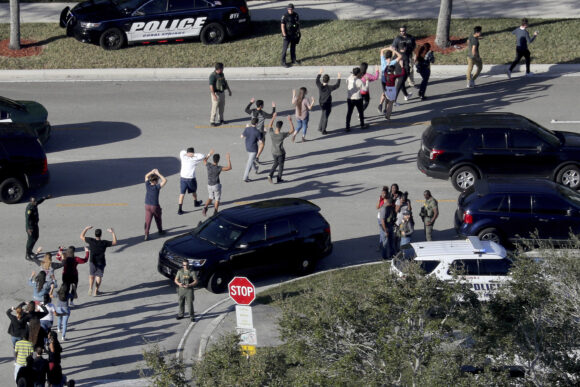In an age of frequent mass shootings, insurers cannot escape coverage by arguing that each pull of the trigger was a “separate occurrence” unless the policy unambiguously says so, a federal appeals court held this week in a case stemming from the deadly 2018 high school shooting in Parkland, Florida.
“Because under controlling Florida law, ‘occurrence’ is ambiguous and must be construed in favor of the insured, the district court did not err by concluding the Parkland shooting was one occurrence under Evanston’s policy and granting summary judgment for the Sheriff on that basis,” a three-judge panel of the U.S. 11th Circuit Court of Appeals concluded in Broward County Sheriff vs. Evanston Insurance Co.
The decision could hold significance for excess and government coverage and could provide another guidepost for insurers on clearly worded policy language.
The excess policy purchased by the sheriff’s office in 2017 had a policy limit of $2.5 million. The sheriff was self-insured up to $500,000, and the policy had a $500,000 deductible.
The sheriff had stationed a deputy as a school resource officer at Marjory Stoneman Douglas High School in Parkland. After a teenaged gunman opened fire in 2018, killing 17 students and teachers and injuring others, the sheriff faced as many as 60 lawsuits from families of the victims, who argued that the resource officer had acted negligently and failed to stop the killings.
Evanston, a Markel Group subsidiary, essentially denied liability and legal defense coverage, contending that the “separate occurrence” clause mean that each injury or death constituted a separate incident – meaning the $500,000 deductible and $500,000 self-insurance retention had to be met for each injury claim before coverage would kick in. By that measure, the sheriff’s office would have needed to spend as much as $60 million on legal costs and judgments before Evanston provided coverage.
Broward Sheriff Gregory Tony and his attorneys argued that the shooting was a single occurrence and that the retention and deductible had been exceeded by the multiple lawsuits and legal fees. The sheriff asked the trial court to declare that Evanston must provide coverage. The trial court, the U.S. District Court in Southern Florida, agreed in 2024, finding that the Evanston policy did not clearly define a “separate occurrence,” and any ambiguity must be construed in favor of the insured.

Evanston appealed and the appellate court panel upheld the lower court in its Nov. 10 opinion. The decision could help clarify a 2003 Florida Supreme Court ruling that has been cited by insurers and insureds alike to support their interpretations of “separate occurrence” language. In a case known as Koikos vs. Travelers Insurance, the state high court had issued a decision that the 11th Circuit judges said was not a “model of clarity.” But subsequent court interpretations of the Koikos ruling have provided guidance.
In the Broward Sheriff case, Evanston’s attorneys relied on the Koikos ruling to bolster their contention that a mass shooting was to be considered multiple events with multiple deductibles. Yes, the 11th Circuit judges noted, the Koikos decision did seem to conclude that a restaurant shooting that injured two people was an example of two separate occurrences.
But more importantly, subsequent rulings have found that the Koikos case was decided on ambiguity grounds – finding that the insurance policy was unclear and must fall in favor of the policyholder.
“Construing the term ‘occurrence’ in favor of the Sheriff, we conclude the entire Parkland shooting was a single occurrence. Because the entire Parkland shooting is one occurrence, only a single SIR (self-insurance retention) applies,” 11th Circuit Judge Frank Hull wrote in the opinion.
The 11th Circuit ruling is the second major decision to come out of the Parkland shooting on the issue of insurance coverage and so-called separate incidents. In a lawsuit brought by a victim’s family against the School Board of Broward County, the Florida Supreme Court in 2020 held that the school shooting was a single incident, for sovereign immunity purposes.
In the sheriff’s lawsuit, the 11th Circuit also shot down Evanston’s claims that a policy wording ambiguity should not be construed in the insured’s favor because, in this case, the sheriff’s office was more than an ordinary policyholder. It is a “sophisticated insured,” Evanston’s lawyers had argued.
The lower court and the appeals court disagreed.

The district court “explained that … Evanston’s arguments relied almost entirely on non-binding caselaw from other jurisdictions and … the sophisticated-insured rule was contrary to well-settled Florida principles of insurance policy interpretation, under which the Sheriff’s subjective intent and supposed sophistication were irrelevant to construing ambiguous policy terms,” the 11th Circuit judges wrote.
The appellate court also ordered Evanston to pay the sheriff’s attorney fees, noting that the shooting and lawsuits came before the Florida Legislature in 2022 prohibited one-way attorney fees in insurance claims disputes.
Markel and Evanston representatives could not be reached for comment, nor could their attorneys in the case. Seth Haimovitch, a lawyer for the Broward Sheriff in the case, referred all questions to the sheriff’s office, which did not respond to queries from Insurance Journal by Thursday evening.
The 11th Circuit opinion can be seen here.
Top photo: Students are evacuated by police from Marjory Stoneman Douglas High School in Parkland, Florida, after the shooting in 2018. (Mike Stocker/South Florida Sun-Sentinel via AP)
Was this article valuable?
Here are more articles you may enjoy.



 World’s Growing Civil Unrest Has an Insurance Sting
World’s Growing Civil Unrest Has an Insurance Sting  ‘Structural Shift’ Occurring in California Surplus Lines
‘Structural Shift’ Occurring in California Surplus Lines  New York’s Mid-Hudson Insurance to Acquire Hanover Fire of Pennsylvania
New York’s Mid-Hudson Insurance to Acquire Hanover Fire of Pennsylvania  Florida Engineers: Winds Under 110 mph Simply Do Not Damage Concrete Tiles
Florida Engineers: Winds Under 110 mph Simply Do Not Damage Concrete Tiles 


